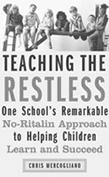 By Chris Mercogliano (Beacon Press, 256 pages, $25.00)
By Chris Mercogliano (Beacon Press, 256 pages, $25.00)
BUY NOW!
Chris Mercogliano has taught at the urban, independently funded Albany Free School for thirty years. The Free School, with fifty or so students ranging in age from two to fourteen, provides a physical and social environment that allows students, in close contact with teachers and other caring adults, to create their own paths to learning. Mercogliano sorts the Free School’s students into two groups; half would likely thrive anywhere, and the other half would likely self-destruct anywhere else. Teaching the Restless tells the stories of several students in this latter group, students likely, in more confined and structured classrooms, to be described as attention-deficit disordered and compelled to take biopsychiatric drugs such as Ritalin.
Mercogliano describes the Free School as structured around the idea that “happy children are ready learners and are intrinsically sociable”; the Free School creates conditions for that happiness to evolve, bringing nurturing, validation, and accountability to the community to bear on each student’s self-directed learning. Not without some anxiety, teachers, students, and parents abandon grades and schedules, trusting that some children learn to read at age three and others at age ten – and that no such “measurable” learning can happen before children feel accepted, engaged, and able to regulate their own responses.
As students enter the Free School, which requires them to be drug-free and which allows them to choose their own activities while holding them strictly accountable for their behavior toward teachers and peers, most children slowly, but steadily, find equilibrium and start learning. At various points, parents and kids themselves express concern about their literacy and numeracy progress; Mercogliano notes the particular worries of an African American boy’s mother as she watches her six-year old son William’s lack of reading progress even as he stabilizes emotionally. Some of those worries seeped into my consciousness even as I was rooting for William to find his emotional roots first so he could then start decoding and understanding.
The Free School made me consider anew what a good school can look like; most schools are unlikely to emulate its practices, but nearly all personalized and student-centered schools will reconsider their own policies and practices in light of Mercogliano’s passionate description of the fusion of freedom and accountability required to set young minds free.
